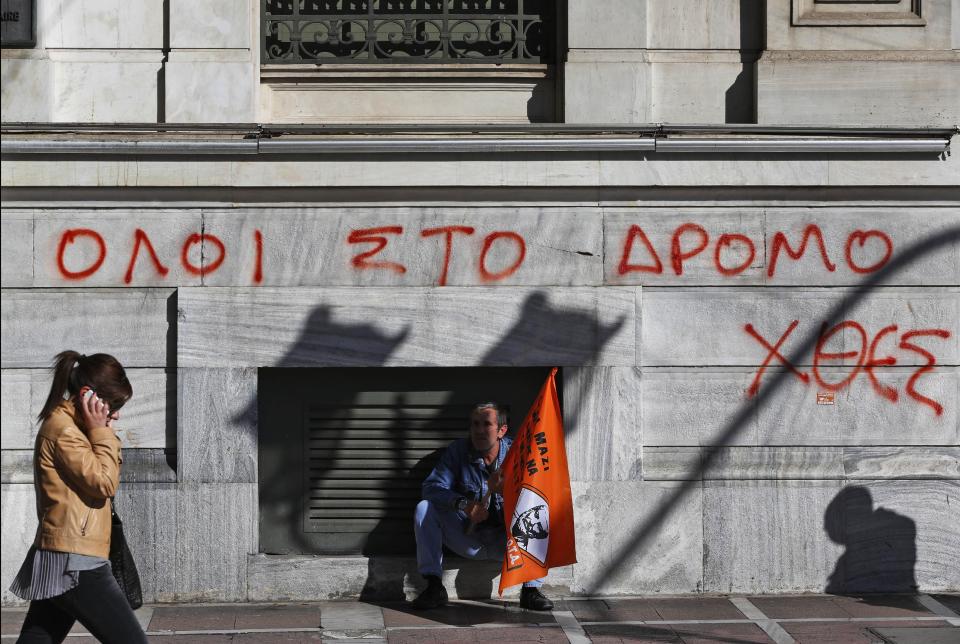Greece to raise cash on markets amid bailout delay
ATHENS, Greece (AP) — Greece will issue short-term debt on Tuesday to make a key bond repayment on Nov. 16, when the cash-strapped country is not yet expected to have received the next batch of its international rescue loans.
It will issue €2.1 billion ($2.7 billion) in treasury bills with the unusually short maturity of four weeks. It will sell another €1 billion in 13-week bills, the Greek Public Debt Management Agency said Friday.
Greece's Parliament last week passed hugely unpopular new cutbacks demanded by the country's bailout creditors in exchange for another €31.5 billion in rescue loans.
But Athens is not expected to get the money next week, as it had initially hoped, because European officials need time to study a report on Greece's public finances. The report will be delivered by debt inspectors to eurozone finance ministers on Monday, according to an EU official, who asked not to be identified in line with the organization's policies.
That means Greece must raise over €5 billion by Nov. 16 to repay maturing three-month treasury bills.
Greek authorities hope the bill auction will be oversubscribed, allowing the government to raise the full sum.
Tuesday's auction would be the shortest term debt issue since Greece was shut out of long term debt markets in 2010.
Manos Chatzidakis, an analyst at Beta Securities in Athens, said the 4-week treasury bill was an unusual but necessary way of making sure Greece can repay its expiring issues.
It would keep Athens afloat until governments of the 17-country eurozone approve the payout of the rescue loans and agree to adjust the country's bailout program to make it sustainable, possibly by extending it by two years.
EU leaders meet on Nov. 22 and 23 and could make a decision then or shortly afterward.
"This is bridge financing ... to ensure that there is no problem with (repaying) bondholders. It is unorthodox, but it's a form of bridge financing and not the beginning of regular such issues. It has a purely technical role," he said. "
Greece finds itself in this position because, after successive general elections in May and June, it has delayed implementing the reforms demanded by its rescue creditors. The next €31.5 billion installment of loans is five months overdue.
To finally secure the payment, Prime Minister Antonis Samaras' rickety coalition government pushed a major austerity bill through parliament early Thursday, inflicting €13.5 billion ($17.3 billion) in additional cuts and tax hikes on Greeks.
Samaras faced down dissent within his three-party coalition, violent protests, and anger from labor unions over the measures that will impose more emergency taxes and slash wages, pensions and benefits.
But only hours after the vote, German Finance Minister Wolfgang Schaeuble said that Greece's euro partners still won't be able to release the next batch of bailout cash at a meeting next week. One of the reasons is that a decision to make Greece's bailout program more sustainable would likely need a vote in the German parliament, which could take a couple weeks.
Fitch ratings agency said Friday that approval of the new cutbacks had reduced the near-term risk of the country's leaving the euro, and should restart rescue loan payments.
But it warned that bringing Greece's crushing debt burden down to sustainable levels will require further relief from its partners and creditors.
It said the European Central Bank should give up profits on its holdings of Greek government bonds, which it bought earlier during the financial crisis. Fitch also said that Europe's bailout fund, called ESM, should help to support Greece's banks, which have collapsed after taking huge losses on Greek debt.
Fitch noted that governments and institutions now hold 70 percent of Greece's debt and should be the ones to help ease the country's debt load. Private creditors have already taken big losses on their Greek bondholdings.
Unions, which staged a 48-hour general strike this week, are planning more demonstrations at the weekend ahead of a Sunday night vote in parliament on the 2013 austerity budget.
___
Don Melvin in Brussels contributed to this report.





